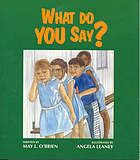Buruwan’s happiness at being praised by her teacher turns to consternation when she is asked to stay back after class. Miss Jones goes to reward her most improved student with her very own wooden pencil case but when Buruwan is prompted to say “thank you” she doesn’t understand why she needs to do this. Angry and embarrassed, Buruwan runs out of class crying, with the sounds of her classmates’ laughter ringing in her ears. When Violet, an older student, explains the teacher’s behaviour, Buruwan understands what she must do even though “in the Wongutha way, when someone gives you something, no one is expected to say thank you.”
Sensitively rendered highly realistic watercolour, gouache and pencil illustrations expand on the story with highly expressive depictions of both Buruwan’s and Miss Jones’ conflicting emotions and offer interesting insights into mission life. The Wongutha language (followed by English translations in brackets) peppers the children’s conversations. A glossary and a pronunciation guide conclude the book.
Based on the childhood experiences of renowned educator and author, May O’Brien BEM descended from the Wongatha people of Western Australia, this is one of four stories that reveal the challenges faced by Aboriginal children growing up in missions in the ‘30s and ‘40s.

